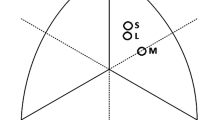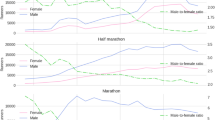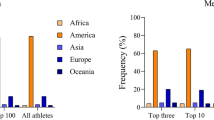Abstract
AGE affects man's ability to run fast but to date there has been little interest in quantitating the relationship. The few published studies, such as the one by Dill on marathon runner Clarence DeMar1, are concerned mainly with reporting lung volume, heart rate, and other physiological characteristics of notable performers, with only brief reviews of race performances over the runner's life span.
This is a preview of subscription content, access via your institution
Access options
Subscribe to this journal
Receive 51 print issues and online access
$199.00 per year
only $3.90 per issue
Buy this article
- Purchase on Springer Link
- Instant access to full article PDF
Prices may be subject to local taxes which are calculated during checkout
Similar content being viewed by others
References
Dill, D., J. natn. Cancer Inst., 35, 185 (1965).
Shepard, J., Donovan, W., and Mundle, P., Age Records 1974 (Track and Field News Press, Los Altos, California, 1974).
Reel, V., Women's Track and Field World (PO Box 371, Claremont, California 91711).
Author information
Authors and Affiliations
Rights and permissions
About this article
Cite this article
MOORE, D. A study of age group track and field records to relate age and running speed. Nature 253, 264–265 (1975). https://doi.org/10.1038/253264a0
Received:
Issue Date:
DOI: https://doi.org/10.1038/253264a0
This article is cited by
-
The age-performance relationship in the general population and strategies to delay age related decline in performance
Archives of Public Health (2019)
-
An integrative modeling approach to the age-performance relationship in mammals at the cellular scale
Scientific Reports (2019)
-
Maximal aerobic power and anaerobic capacity in cycling across the age spectrum in male master athletes
European Journal of Applied Physiology (2016)
-
Has Athletic Performance Reached its Peak?
Sports Medicine (2015)
-
A rise in peak performance age in female athletes
AGE (2015)
Comments
By submitting a comment you agree to abide by our Terms and Community Guidelines. If you find something abusive or that does not comply with our terms or guidelines please flag it as inappropriate.



